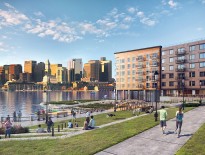
Paul Bauer
While implementation of the commonwealth’s recreational marijuana legalization has been slow, as of July 1, licensed facilities may now sell marijuana. Possession of marijuana remains illegal at the federal level, which creates some concerns for residents and landlords alike.
With almost two years of marijuana legalization under our belt and with legal recreational sales imminent, it is a good time for a residential landlord to review its legal and practical treatment of tenant marijuana issues.
Under Massachusetts law, adults 21 or older are generally allowed to possess up to one ounce of marijuana or five grams of concentrate and inside an individual’s residence may possess up to 10 ounces of marijuana. Adults may individually possess and cultivate up to six marijuana plants with a maximum of 12 plants per residence. At the federal level, the primary concern for a landlord is the civil forfeiture law under which it is possible for the government to seize property that is used by someone other than the owner to commit a crime.
A residential landlord may have several concerns regarding marijuana use in tenant units. First, a landlord will want to protect its building and unit from damage. In addition, a landlord will want to ensure that one tenant’s use of their unit does not unduly impact other residents in the building. Finally, a landlord will want to ensure it complies with laws and lender and insurer requirements in owning and managing the property.
An individual can consume marijuana by inhaling smoke from burning, inhaling the aerosol from vaporization (“vaping”) or by ingestion. A landlord could conclude that it wishes to ban marijuana possession on its property. While this certainly is a method of protection against violation of federal law, there are several drawbacks.
First, residents relying on medical marijuana pursuant to a physician’s prescription could have a claim against the landlord for failing to accommodate their medical needs by not allowing any means for the resident to lawfully (at least at the state level) use a prescribed medication. Second, given that the law legalizing marijuana passed by a majority of voters in Massachusetts, expressly prohibiting possession in its building could be a marketing impediment for leasing units, particularly in certain demographics. Finally, prohibiting possession is difficult to enforce and could expose the landlord to resident defenses of selective enforcement in an eviction proceeding.
A better approach is to prohibit the activity that could more directly impact on the safety of the building and residents. First, most leases have a “compliance with law” section. A landlord should review its lease form and determine whether the clause is robust enough to protect against activities, such as sales or possession of large amounts of marijuana, that remain illegal under Massachusetts law, without specifically referencing any particular law. This compliance with law covenant will also provide a measure of protection pursuant to federal law.
Second, many residential leases prohibit smoking in the unit. As long as the clause is not limited to smoking tobacco products, it should cover marijuana smoking as well. In buildings where smoking is allowed in the units, a landlord will need to determine whether residents in other units will be adversely affected by second-hand marijuana smoke as differentiated from tobacco smoke. It is recommended that the lease contain a “no nuisance” clause that will provide the landlord with some latitude should it receive complaints related to marijuana smoke. A landlord will need to review all factors before instituting a policy or lease provision permitting tobacco smoking, but prohibiting marijuana smoking.
Third, a landlord now needs to contemplate another inhalation method, vaping, where the user inhales marijuana aerosol. Here, the cannabis is heated at low temperatures, but no combustion or burning occurs so there is no smoke. At the same time, public buildings have found that tobacco users can trigger smoke alarms by vaping tobacco in restrooms so the aerosol from vaping can be discernible. If a landlord desires to prohibit vaping in the building, it should clearly state such prohibition in the lease to avoid an argument that “no smoking” does not include “no vaping.” Of course, this may have a marketing impact and other landlords may conclude that the “no nuisance” clause provides enough protection to permit enforcement on a case-by-case basis.
Plant Growing Issues
Another issue is growing of marijuana plants. Again, a landlord could expressly prohibit growing marijuana, but this might be overkill along the lines of a full prohibition. A better approach is to address the primary issues with marijuana cultivation in a unit. The primary issues here arise from growing marijuana using hydroponic growing systems and grow lights. At least one landlord banned growing marijuana plants due to concerns that the electrical systems for pumps and lights create a fire hazard. Insurers, however, have not broadly agreed and have not generally moved to require landlords to prohibit hydroponics and lights.
A more reasonable concern is the electricity and to a lesser extent the water used in such systems. Where utilities are not separately metered to a unit, if a landlord concludes that the impact on electricity charges will be meaningful, it is reasonable to ban hydroponics and grow lights (broadly and not just for marijuana plants) due to the increased electricity used in such systems.
Due to federal law compliance issues, banks have elevated concerns regarding legalized marijuana. Primarily, this has impacted property owners with mortgages on property that wish to lease to dispensaries, grow facilities or marijuana distributors. To date, lenders have not required residential leases to ban marijuana. A simple “compliance with law” section should suffice.
The legalization of marijuana in Massachusetts creates the need for a residential landlord to review its current lease form and policies and make adjustments to address marijuana possession and use by its tenants in light of the both the concerns identified and addressed in this article as well as the experience the landlord has had to date with marijuana use in its building.
Paul Bauer is the real estate and environmental practice area leader at the Massachusetts-based law firm of Bowditch & Dewey. He represents businesses, individuals and institutions throughout the state in sophisticated transactions with an emphasis on big real estate projects and challenging commercial law issues.




 |
| 
